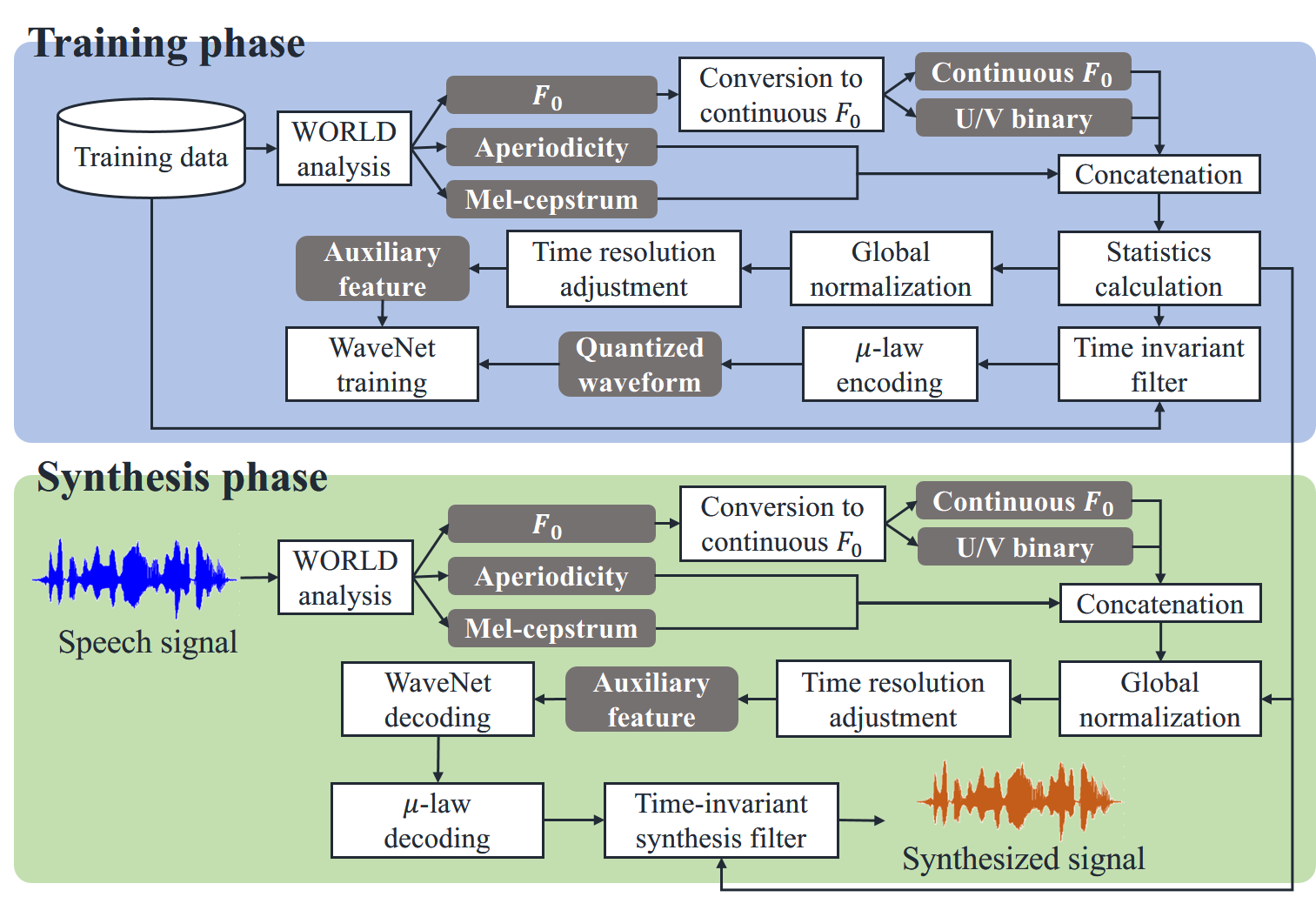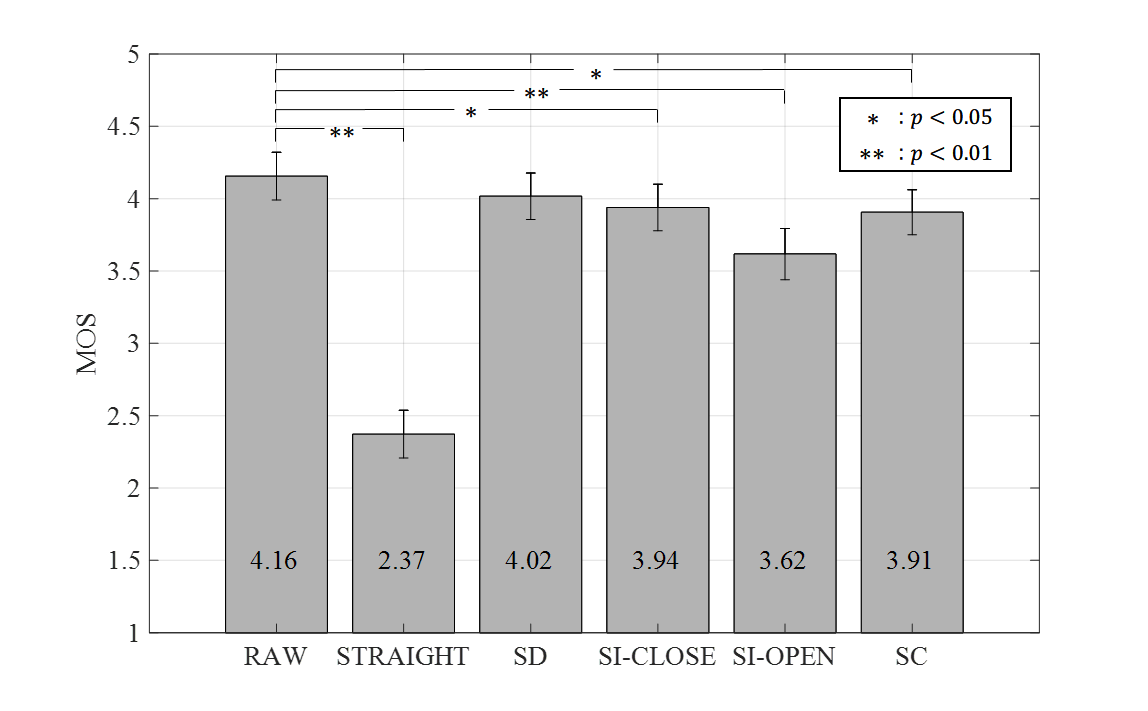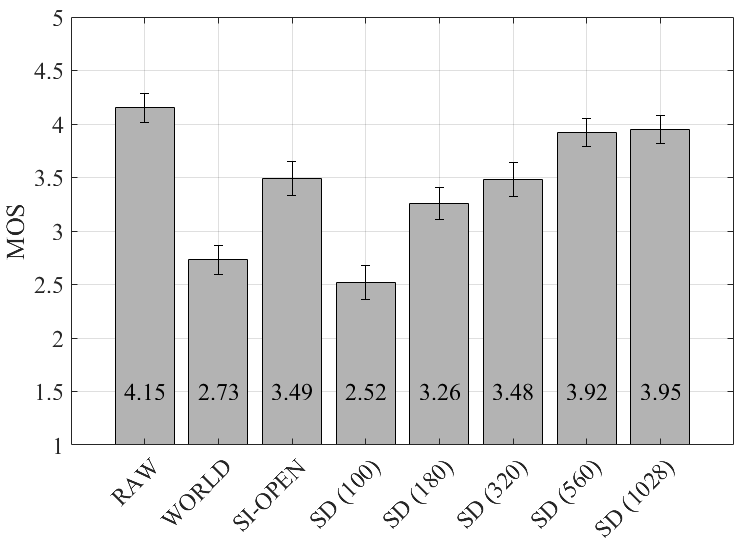I'm trying to train a model on 200 wav files (100 train/val) from the nancy corpus (Blizzard 2011 dataset). I modified the egs/arctic/sd/run.sh script to process my own files.
I get an error due to some issues with size of batch tensor, perhaps something having to do with upsampling?
# train.py --n_gpus 1 --waveforms data/train/wav_ns.scp --feats data/train/feats.scp --stats data/train/stats.h5 --expdir exp/tr_nancy_16k_sd_nancy_lr1e-4_wd0.0_bl20000_bs1_ns_up --n_quantize 256 --n_aux 28 --n_resch 512 --n_skipch 256 --dilation_depth 10 --dilation_repeat 3 --lr 1e-4 --weight_decay 0.0 --iters 200000 --batch_length 20000 --batch_size 1 --checkpoints 10000 --use_speaker_code false --upsampling_factor 80 --resume
# Started at Wed Mar 14 20:48:13 UTC 2018
#
/home/ubuntu/PytorchWaveNetVocoder/tools/venv/lib/python3.6/site-packages/h5py/__init__.py:36: FutureWarning: Conversion of the second argument of issubdtype from `float` to `np.floating` is deprecated. In future, it will be treated as `np.float64 == np.dtype(float).type`.
from ._conv import register_converters as _register_converters
WaveNet(
(onehot): OneHot(
)
(causal): CausalConv1d(
(conv): Conv1d(256, 512, kernel_size=(2,), stride=(1,), padding=(1,))
)
(upsampling): UpSampling(
(conv): ConvTranspose2d(1, 1, kernel_size=(1, 80), stride=(1, 80))
)
(dil_sigmoid): ModuleList(
(0): CausalConv1d(
(conv): Conv1d(512, 512, kernel_size=(2,), stride=(1,), padding=(1,))
)
(1): CausalConv1d(
(conv): Conv1d(512, 512, kernel_size=(2,), stride=(1,), padding=(2,), dilation=(2,))
)
(2): CausalConv1d(
(conv): Conv1d(512, 512, kernel_size=(2,), stride=(1,), padding=(4,), dilation=(4,))
)
(3): CausalConv1d(
(conv): Conv1d(512, 512, kernel_size=(2,), stride=(1,), padding=(8,), dilation=(8,))
)
(4): CausalConv1d(
(conv): Conv1d(512, 512, kernel_size=(2,), stride=(1,), padding=(16,), dilation=(16,))
)
(5): CausalConv1d(
(conv): Conv1d(512, 512, kernel_size=(2,), stride=(1,), padding=(32,), dilation=(32,))
)
(6): CausalConv1d(
(conv): Conv1d(512, 512, kernel_size=(2,), stride=(1,), padding=(64,), dilation=(64,))
)
(7): CausalConv1d(
(conv): Conv1d(512, 512, kernel_size=(2,), stride=(1,), padding=(128,), dilation=(128,))
)
(8): CausalConv1d(
(conv): Conv1d(512, 512, kernel_size=(2,), stride=(1,), padding=(256,), dilation=(256,))
)
(9): CausalConv1d(
(conv): Conv1d(512, 512, kernel_size=(2,), stride=(1,), padding=(512,), dilation=(512,))
)
(10): CausalConv1d(
(conv): Conv1d(512, 512, kernel_size=(2,), stride=(1,), padding=(1,))
)
(11): CausalConv1d(
(conv): Conv1d(512, 512, kernel_size=(2,), stride=(1,), padding=(2,), dilation=(2,))
)
(12): CausalConv1d(
(conv): Conv1d(512, 512, kernel_size=(2,), stride=(1,), padding=(4,), dilation=(4,))
)
(13): CausalConv1d(
(conv): Conv1d(512, 512, kernel_size=(2,), stride=(1,), padding=(8,), dilation=(8,))
)
(14): CausalConv1d(
(conv): Conv1d(512, 512, kernel_size=(2,), stride=(1,), padding=(16,), dilation=(16,))
)
(15): CausalConv1d(
(conv): Conv1d(512, 512, kernel_size=(2,), stride=(1,), padding=(32,), dilation=(32,))
)
(16): CausalConv1d(
(conv): Conv1d(512, 512, kernel_size=(2,), stride=(1,), padding=(64,), dilation=(64,))
)
(17): CausalConv1d(
(conv): Conv1d(512, 512, kernel_size=(2,), stride=(1,), padding=(128,), dilation=(128,))
)
(18): CausalConv1d(
(conv): Conv1d(512, 512, kernel_size=(2,), stride=(1,), padding=(256,), dilation=(256,))
)
(19): CausalConv1d(
(conv): Conv1d(512, 512, kernel_size=(2,), stride=(1,), padding=(512,), dilation=(512,))
)
(20): CausalConv1d(
(conv): Conv1d(512, 512, kernel_size=(2,), stride=(1,), padding=(1,))
)
(21): CausalConv1d(
(conv): Conv1d(512, 512, kernel_size=(2,), stride=(1,), padding=(2,), dilation=(2,))
)
(22): CausalConv1d(
(conv): Conv1d(512, 512, kernel_size=(2,), stride=(1,), padding=(4,), dilation=(4,))
)
(23): CausalConv1d(
(conv): Conv1d(512, 512, kernel_size=(2,), stride=(1,), padding=(8,), dilation=(8,))
)
(24): CausalConv1d(
(conv): Conv1d(512, 512, kernel_size=(2,), stride=(1,), padding=(16,), dilation=(16,))
)
(25): CausalConv1d(
(conv): Conv1d(512, 512, kernel_size=(2,), stride=(1,), padding=(32,), dilation=(32,))
)
(26): CausalConv1d(
(conv): Conv1d(512, 512, kernel_size=(2,), stride=(1,), padding=(64,), dilation=(64,))
)
(27): CausalConv1d(
(conv): Conv1d(512, 512, kernel_size=(2,), stride=(1,), padding=(128,), dilation=(128,))
)
(28): CausalConv1d(
(conv): Conv1d(512, 512, kernel_size=(2,), stride=(1,), padding=(256,), dilation=(256,))
)
(29): CausalConv1d(
(conv): Conv1d(512, 512, kernel_size=(2,), stride=(1,), padding=(512,), dilation=(512,))
)
)
(dil_tanh): ModuleList(
(0): CausalConv1d(
(conv): Conv1d(512, 512, kernel_size=(2,), stride=(1,), padding=(1,))
)
(1): CausalConv1d(
(conv): Conv1d(512, 512, kernel_size=(2,), stride=(1,), padding=(2,), dilation=(2,))
)
(2): CausalConv1d(
(conv): Conv1d(512, 512, kernel_size=(2,), stride=(1,), padding=(4,), dilation=(4,))
)
(3): CausalConv1d(
(conv): Conv1d(512, 512, kernel_size=(2,), stride=(1,), padding=(8,), dilation=(8,))
)
(4): CausalConv1d(
(conv): Conv1d(512, 512, kernel_size=(2,), stride=(1,), padding=(16,), dilation=(16,))
)
(5): CausalConv1d(
(conv): Conv1d(512, 512, kernel_size=(2,), stride=(1,), padding=(32,), dilation=(32,))
)
(6): CausalConv1d(
(conv): Conv1d(512, 512, kernel_size=(2,), stride=(1,), padding=(64,), dilation=(64,))
)
(7): CausalConv1d(
(conv): Conv1d(512, 512, kernel_size=(2,), stride=(1,), padding=(128,), dilation=(128,))
)
(8): CausalConv1d(
(conv): Conv1d(512, 512, kernel_size=(2,), stride=(1,), padding=(256,), dilation=(256,))
)
(9): CausalConv1d(
(conv): Conv1d(512, 512, kernel_size=(2,), stride=(1,), padding=(512,), dilation=(512,))
)
(10): CausalConv1d(
(conv): Conv1d(512, 512, kernel_size=(2,), stride=(1,), padding=(1,))
)
(11): CausalConv1d(
(conv): Conv1d(512, 512, kernel_size=(2,), stride=(1,), padding=(2,), dilation=(2,))
)
(12): CausalConv1d(
(conv): Conv1d(512, 512, kernel_size=(2,), stride=(1,), padding=(4,), dilation=(4,))
)
(13): CausalConv1d(
(conv): Conv1d(512, 512, kernel_size=(2,), stride=(1,), padding=(8,), dilation=(8,))
)
(14): CausalConv1d(
(conv): Conv1d(512, 512, kernel_size=(2,), stride=(1,), padding=(16,), dilation=(16,))
)
(15): CausalConv1d(
(conv): Conv1d(512, 512, kernel_size=(2,), stride=(1,), padding=(32,), dilation=(32,))
)
(16): CausalConv1d(
(conv): Conv1d(512, 512, kernel_size=(2,), stride=(1,), padding=(64,), dilation=(64,))
)
(17): CausalConv1d(
(conv): Conv1d(512, 512, kernel_size=(2,), stride=(1,), padding=(128,), dilation=(128,))
)
(18): CausalConv1d(
(conv): Conv1d(512, 512, kernel_size=(2,), stride=(1,), padding=(256,), dilation=(256,))
)
(19): CausalConv1d(
(conv): Conv1d(512, 512, kernel_size=(2,), stride=(1,), padding=(512,), dilation=(512,))
)
(20): CausalConv1d(
(conv): Conv1d(512, 512, kernel_size=(2,), stride=(1,), padding=(1,))
)
(21): CausalConv1d(
(conv): Conv1d(512, 512, kernel_size=(2,), stride=(1,), padding=(2,), dilation=(2,))
)
(22): CausalConv1d(
(conv): Conv1d(512, 512, kernel_size=(2,), stride=(1,), padding=(4,), dilation=(4,))
)
(23): CausalConv1d(
(conv): Conv1d(512, 512, kernel_size=(2,), stride=(1,), padding=(8,), dilation=(8,))
)
(24): CausalConv1d(
(conv): Conv1d(512, 512, kernel_size=(2,), stride=(1,), padding=(16,), dilation=(16,))
)
(25): CausalConv1d(
(conv): Conv1d(512, 512, kernel_size=(2,), stride=(1,), padding=(32,), dilation=(32,))
)
(26): CausalConv1d(
(conv): Conv1d(512, 512, kernel_size=(2,), stride=(1,), padding=(64,), dilation=(64,))
)
(27): CausalConv1d(
(conv): Conv1d(512, 512, kernel_size=(2,), stride=(1,), padding=(128,), dilation=(128,))
)
(28): CausalConv1d(
(conv): Conv1d(512, 512, kernel_size=(2,), stride=(1,), padding=(256,), dilation=(256,))
)
(29): CausalConv1d(
(conv): Conv1d(512, 512, kernel_size=(2,), stride=(1,), padding=(512,), dilation=(512,))
)
)
(aux_1x1_sigmoid): ModuleList(
(0): Conv1d(28, 512, kernel_size=(1,), stride=(1,))
(1): Conv1d(28, 512, kernel_size=(1,), stride=(1,))
(2): Conv1d(28, 512, kernel_size=(1,), stride=(1,))
(3): Conv1d(28, 512, kernel_size=(1,), stride=(1,))
(4): Conv1d(28, 512, kernel_size=(1,), stride=(1,))
(5): Conv1d(28, 512, kernel_size=(1,), stride=(1,))
(6): Conv1d(28, 512, kernel_size=(1,), stride=(1,))
(7): Conv1d(28, 512, kernel_size=(1,), stride=(1,))
(8): Conv1d(28, 512, kernel_size=(1,), stride=(1,))
(9): Conv1d(28, 512, kernel_size=(1,), stride=(1,))
(10): Conv1d(28, 512, kernel_size=(1,), stride=(1,))
(11): Conv1d(28, 512, kernel_size=(1,), stride=(1,))
(12): Conv1d(28, 512, kernel_size=(1,), stride=(1,))
(13): Conv1d(28, 512, kernel_size=(1,), stride=(1,))
(14): Conv1d(28, 512, kernel_size=(1,), stride=(1,))
(15): Conv1d(28, 512, kernel_size=(1,), stride=(1,))
(16): Conv1d(28, 512, kernel_size=(1,), stride=(1,))
(17): Conv1d(28, 512, kernel_size=(1,), stride=(1,))
(18): Conv1d(28, 512, kernel_size=(1,), stride=(1,))
(19): Conv1d(28, 512, kernel_size=(1,), stride=(1,))
(20): Conv1d(28, 512, kernel_size=(1,), stride=(1,))
(21): Conv1d(28, 512, kernel_size=(1,), stride=(1,))
(22): Conv1d(28, 512, kernel_size=(1,), stride=(1,))
(23): Conv1d(28, 512, kernel_size=(1,), stride=(1,))
(24): Conv1d(28, 512, kernel_size=(1,), stride=(1,))
(25): Conv1d(28, 512, kernel_size=(1,), stride=(1,))
(26): Conv1d(28, 512, kernel_size=(1,), stride=(1,))
(27): Conv1d(28, 512, kernel_size=(1,), stride=(1,))
(28): Conv1d(28, 512, kernel_size=(1,), stride=(1,))
(29): Conv1d(28, 512, kernel_size=(1,), stride=(1,))
)
(aux_1x1_tanh): ModuleList(
(0): Conv1d(28, 512, kernel_size=(1,), stride=(1,))
(1): Conv1d(28, 512, kernel_size=(1,), stride=(1,))
(2): Conv1d(28, 512, kernel_size=(1,), stride=(1,))
(3): Conv1d(28, 512, kernel_size=(1,), stride=(1,))
(4): Conv1d(28, 512, kernel_size=(1,), stride=(1,))
(5): Conv1d(28, 512, kernel_size=(1,), stride=(1,))
(6): Conv1d(28, 512, kernel_size=(1,), stride=(1,))
(7): Conv1d(28, 512, kernel_size=(1,), stride=(1,))
(8): Conv1d(28, 512, kernel_size=(1,), stride=(1,))
(9): Conv1d(28, 512, kernel_size=(1,), stride=(1,))
(10): Conv1d(28, 512, kernel_size=(1,), stride=(1,))
(11): Conv1d(28, 512, kernel_size=(1,), stride=(1,))
(12): Conv1d(28, 512, kernel_size=(1,), stride=(1,))
(13): Conv1d(28, 512, kernel_size=(1,), stride=(1,))
(14): Conv1d(28, 512, kernel_size=(1,), stride=(1,))
(15): Conv1d(28, 512, kernel_size=(1,), stride=(1,))
(16): Conv1d(28, 512, kernel_size=(1,), stride=(1,))
(17): Conv1d(28, 512, kernel_size=(1,), stride=(1,))
(18): Conv1d(28, 512, kernel_size=(1,), stride=(1,))
(19): Conv1d(28, 512, kernel_size=(1,), stride=(1,))
(20): Conv1d(28, 512, kernel_size=(1,), stride=(1,))
(21): Conv1d(28, 512, kernel_size=(1,), stride=(1,))
(22): Conv1d(28, 512, kernel_size=(1,), stride=(1,))
(23): Conv1d(28, 512, kernel_size=(1,), stride=(1,))
(24): Conv1d(28, 512, kernel_size=(1,), stride=(1,))
(25): Conv1d(28, 512, kernel_size=(1,), stride=(1,))
(26): Conv1d(28, 512, kernel_size=(1,), stride=(1,))
(27): Conv1d(28, 512, kernel_size=(1,), stride=(1,))
(28): Conv1d(28, 512, kernel_size=(1,), stride=(1,))
(29): Conv1d(28, 512, kernel_size=(1,), stride=(1,))
)
(skip_1x1): ModuleList(
(0): Conv1d(512, 256, kernel_size=(1,), stride=(1,))
(1): Conv1d(512, 256, kernel_size=(1,), stride=(1,))
(2): Conv1d(512, 256, kernel_size=(1,), stride=(1,))
(3): Conv1d(512, 256, kernel_size=(1,), stride=(1,))
(4): Conv1d(512, 256, kernel_size=(1,), stride=(1,))
(5): Conv1d(512, 256, kernel_size=(1,), stride=(1,))
(6): Conv1d(512, 256, kernel_size=(1,), stride=(1,))
(7): Conv1d(512, 256, kernel_size=(1,), stride=(1,))
(8): Conv1d(512, 256, kernel_size=(1,), stride=(1,))
(9): Conv1d(512, 256, kernel_size=(1,), stride=(1,))
(10): Conv1d(512, 256, kernel_size=(1,), stride=(1,))
(11): Conv1d(512, 256, kernel_size=(1,), stride=(1,))
(12): Conv1d(512, 256, kernel_size=(1,), stride=(1,))
(13): Conv1d(512, 256, kernel_size=(1,), stride=(1,))
(14): Conv1d(512, 256, kernel_size=(1,), stride=(1,))
(15): Conv1d(512, 256, kernel_size=(1,), stride=(1,))
(16): Conv1d(512, 256, kernel_size=(1,), stride=(1,))
(17): Conv1d(512, 256, kernel_size=(1,), stride=(1,))
(18): Conv1d(512, 256, kernel_size=(1,), stride=(1,))
(19): Conv1d(512, 256, kernel_size=(1,), stride=(1,))
(20): Conv1d(512, 256, kernel_size=(1,), stride=(1,))
(21): Conv1d(512, 256, kernel_size=(1,), stride=(1,))
(22): Conv1d(512, 256, kernel_size=(1,), stride=(1,))
(23): Conv1d(512, 256, kernel_size=(1,), stride=(1,))
(24): Conv1d(512, 256, kernel_size=(1,), stride=(1,))
(25): Conv1d(512, 256, kernel_size=(1,), stride=(1,))
(26): Conv1d(512, 256, kernel_size=(1,), stride=(1,))
(27): Conv1d(512, 256, kernel_size=(1,), stride=(1,))
(28): Conv1d(512, 256, kernel_size=(1,), stride=(1,))
(29): Conv1d(512, 256, kernel_size=(1,), stride=(1,))
)
(res_1x1): ModuleList(
(0): Conv1d(512, 512, kernel_size=(1,), stride=(1,))
(1): Conv1d(512, 512, kernel_size=(1,), stride=(1,))
(2): Conv1d(512, 512, kernel_size=(1,), stride=(1,))
(3): Conv1d(512, 512, kernel_size=(1,), stride=(1,))
(4): Conv1d(512, 512, kernel_size=(1,), stride=(1,))
(5): Conv1d(512, 512, kernel_size=(1,), stride=(1,))
(6): Conv1d(512, 512, kernel_size=(1,), stride=(1,))
(7): Conv1d(512, 512, kernel_size=(1,), stride=(1,))
(8): Conv1d(512, 512, kernel_size=(1,), stride=(1,))
(9): Conv1d(512, 512, kernel_size=(1,), stride=(1,))
(10): Conv1d(512, 512, kernel_size=(1,), stride=(1,))
(11): Conv1d(512, 512, kernel_size=(1,), stride=(1,))
(12): Conv1d(512, 512, kernel_size=(1,), stride=(1,))
(13): Conv1d(512, 512, kernel_size=(1,), stride=(1,))
(14): Conv1d(512, 512, kernel_size=(1,), stride=(1,))
(15): Conv1d(512, 512, kernel_size=(1,), stride=(1,))
(16): Conv1d(512, 512, kernel_size=(1,), stride=(1,))
(17): Conv1d(512, 512, kernel_size=(1,), stride=(1,))
(18): Conv1d(512, 512, kernel_size=(1,), stride=(1,))
(19): Conv1d(512, 512, kernel_size=(1,), stride=(1,))
(20): Conv1d(512, 512, kernel_size=(1,), stride=(1,))
(21): Conv1d(512, 512, kernel_size=(1,), stride=(1,))
(22): Conv1d(512, 512, kernel_size=(1,), stride=(1,))
(23): Conv1d(512, 512, kernel_size=(1,), stride=(1,))
(24): Conv1d(512, 512, kernel_size=(1,), stride=(1,))
(25): Conv1d(512, 512, kernel_size=(1,), stride=(1,))
(26): Conv1d(512, 512, kernel_size=(1,), stride=(1,))
(27): Conv1d(512, 512, kernel_size=(1,), stride=(1,))
(28): Conv1d(512, 512, kernel_size=(1,), stride=(1,))
(29): Conv1d(512, 512, kernel_size=(1,), stride=(1,))
)
(conv_post_1): Conv1d(256, 256, kernel_size=(1,), stride=(1,))
(conv_post_2): Conv1d(256, 256, kernel_size=(1,), stride=(1,))
)
number of training data = 100.
batch length is decreased due to upsampling (20000 -> 19970)
Traceback (most recent call last):
File "../../../src/bin/train.py", line 513, in <module>
main()
File "../../../src/bin/train.py", line 474, in main
batch_output = model(batch_x, batch_h)
File "/home/ubuntu/PytorchWaveNetVocoder/tools/venv/lib/python3.6/site-packages/torch/nn/modules/module.py", line 357, in __call__
result = self.forward(*input, **kwargs)
File "/home/ubuntu/PytorchWaveNetVocoder/src/nets/wavenet.py", line 237, in forward
self.skip_1x1[l], self.res_1x1[l])
File "/home/ubuntu/PytorchWaveNetVocoder/src/nets/wavenet.py", line 511, in _residual_forward
aux_output_sigmoid = aux_1x1_sigmoid(h)
File "/home/ubuntu/PytorchWaveNetVocoder/tools/venv/lib/python3.6/site-packages/torch/nn/modules/module.py", line 357, in __call__
result = self.forward(*input, **kwargs)
File "/home/ubuntu/PytorchWaveNetVocoder/tools/venv/lib/python3.6/site-packages/torch/nn/modules/conv.py", line 168, in forward
self.padding, self.dilation, self.groups)
File "/home/ubuntu/PytorchWaveNetVocoder/tools/venv/lib/python3.6/site-packages/torch/nn/functional.py", line 54, in conv1d
return f(input, weight, bias)
RuntimeError: Given groups=1, weight[512, 28, 1], so expected input[1, 64, 23040] to have 28 channels, but got 64 channels instead
# Accounting: time=7 threads=1
# Ended (code 1) at Wed Mar 14 20:48:20 UTC 2018, elapsed time 7 seconds



